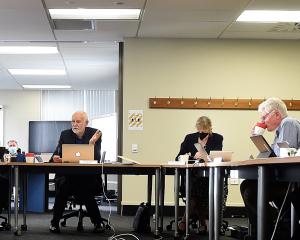The Southern District Health Board wanted to appoint a neurosurgeon for just two years, rather than for a longer term, causing "some tension" between Dunedin Hospital management and the South Island neurosurgical service, the National Health Board's Dunedin Hospital report reveals.
"It is highly unlikely that a two-year appointment would be considered attractive by any suitable candidate," the report, released last Friday, said.
Neurosurgeons for the Dunedin hub of the South Island Neurosurgical Service are being recruited, including a fixed-term appointment to fill a gap while the University of Otago appoints two academics, one a professor.
To ensure Dunedin can sustain neurosurgery, last year's South Island neurosurgery expert panel recommended the city have three neurosurgeons, two with academic duties.
South Island neurosurgical service implementation manager Joy Farley said when contacted Southern DHB had feared the financial risk of being left with an extra neurosurgeon.
"It's the tension between managing for the short term and investing for the longer term and I imagine that's part and parcel of a lot of things that have come out of that [National Health Board] review."
For the South Island service to work it had to take a long-term view, and that involved taking a financial risk.
"We were engaged in a long-term sort of plan and Southern DHB was focused on the short term.
"We want to have stable, secure staffing."
It was uncertain how long it would take to appoint both academic roles, especially the professor.
Because of the flexibility of the South Island-wide service, an additional neurosurgeon could be asked to work from the Christchurch hub, thereby mitigating the financial risk for Southern DHB.
Ms Farley said the service had decided to appoint a neurosurgeon for three to four years.
There was a "huge difference" between a two-year appointment and one of up to four years, as it was long enough to make moving to Dunedin worthwhile.
"The likelihood of getting someone to come for a fixed-term period of two years is much less than three to four years.
"We want to avoid [relying on locums] at all cost."
The issue had been resolved.
"There's no tension now - we're moving forward."
In a separate development, Ms Farley hoped to make an announcement on the appointment of the permanent hospital-based neurosurgeon next week.
Dunedin Medical School dean Dr John Adams said appointing academics was a lengthy process.
Recruitment efforts were under way for the lecturer post, but "not so much under way" for the professor.
The situation had created a dilemma for the health board.
"Should they appoint somebody on a fixed-term basis to cover the gap until they arrive, or should they appoint a permanent person? And of course, there are issues either way," Dr Adams said.











